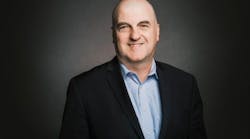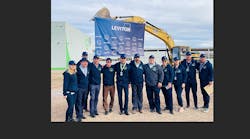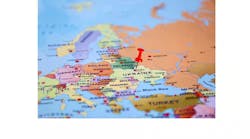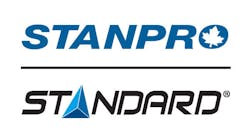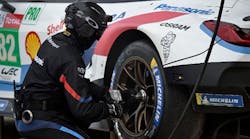Editor's note: In EW's December 1998 issue, the article "Global Crisis" (page 46) explored how various electrical companies with international interests were weathering the global financial storm. In our continuing coverage of the global market, the following article looks into how several electrical distributors and one independent manufacturers' rep do business overseas, and examines the future business opportunities they see in this fascinating market.
The Asian Flu, post-Cold War geopolitical realignments, and highly volatile and unpredictable conditions in any number of local marketplaces abroad haven't daunted the U.S. distributors that have established businesses in overseas markets.
Relatively few U.S. electrical distributors have a big interest in overseas markets, but most of the ones that do have been in the business for years. Three of the four national chains are active in this market: GE Supply, Inc., Shelton, Conn.; Graybar Electric Co., St. Louis, Mo.; and WESCO Distribution, Inc., Pittsburgh, Pa.; Argo International Corp., New York, N.Y.; Benfield International Ltd., White Plains, N.Y.; and Warren Electric Group, Houston, Texas, are among the distributors that focus on international business and have branches in foreign countries.
Managers from these companies believe the potential profits from this business more than outweigh the risks and that downturns in foreign economies can present a window of opportunity for the wary entrepreneur. They are banking on the fact that plenty of places exist around the globe where U.S. companies can deliver the electrical and industrial goods on time and at the right price.
"Granted, everybody is talking about the weakness and vulnerability of Asian stock markets and economies," says John SantaCroce, president and chief operating officer of Argo International Corp. "There has been an undeniable domino effect that has impacted markets including the old East Bloc, Canada, Mexico, Central and South America, and the West Coast more than the East Coast here in the States. But this hasn't slowed our growth plans, because we're in for the long haul."
Indeed, other distributors active in the global market are also looking past the current economic uncertainty in many regions and still see profitable business. For instance, WESCO plans to ride out the current storm by focusing on specific projects, says Bill Goodwin, vice president of WESCO's International Group. "As soon as those economies settle down, we'll be looking at more permanent arrangements."
Warren Electric, for years a big player in the Caribbean market, recently expanded in that region by opening up several new branches. Cheryl Thompson-Draper, the company's chairman and chief executive officer, expects 15% growth in the region this year.
The strategy of these companies parallels that of stock analysts who counsel that holding on to and even increasing investments in foreign markets is the best course now to weather the storms of the impending millennium. Their strategy may also have something to do with staying in a game of stud poker when you're holding kings and queens, and you've seen two aces go elsewhere. However, the old rules no longer apply in the international game, says one veteran in this market. Twenty years of traveling the globe to market electrical products for Electro-Mechanical Systems International, Ltd. (EMSI), his international manufacturers' rep agency, have taught John O'Donnell, managing director of the Philadelphia, Pa.-based company that only the most nimble can survive the tumult in this market.
"Any U.S. distributor contemplating expansion overseas has to develop a mindset that the old standards no longer apply. By standards I mean not only IEC versus NEC standards, but standard vendor-distributor relations that they've been used to," he says.
Buying Here to Get There There are various routes to expanding a company's existing overseas business, and one of them is acquisition of other U.S. firms already involved in global markets. As part of its acquisitions surge over the past few years, WESCO acquired three companies with an international focus: Avon Electrical Supplies, Inc., Hauppauge, N.Y.; Bruckner Supply Co., Port Washington, N.Y.; and Reily Electrical Supply, Inc., Metairie, La. Avon Electrical Supplies has an international division that primarily serves contractors with project-driven business, Reily Electrical Supply serves the oil and gas industry and supports its domestic customers internationally through its branches in Louisiana and Texas, and Bruckner, an integrated-supply specialist, has contracts with customers who have facilities around the globe.
"We'll support their efforts as they continue to expand internationally," says Bill Goodwin. "This will happen fairly quickly with Canada and Mexico, and then will include Latin America and Europe. It's a bit early to determine where all of this will go, but we have had significant discussions with Bruckner about implementation processes outside of the U.S."
In addition to these acquisitions, WESCO has 50 locations in Canada, Guam, Puerto Rico, Mexico and the United Kingdom and manages a business in Saudi Arabia. The company also plans to expand into South America and Southeast Asia, and into Azerbaijan and Kazakhstan in the former Soviet Union. WESCO now has close to 900 employees outside the U.S., and its international sales account for some 11% of its total $2.6 billion in annual revenues. The company wants to grow its international business (excluding Canada) by approximately $200 million over the next two years.
"Our basic premise has always been to follow our customers and their subsidiaries wherever they want us to go," Goodwin says. "For us, that process continues to be natural-resource driven-principally oil and gas, petrochemicals, and mining, plus the new opportunities related to integrated supply. We support our customers in locations where existing distribution is either unfamiliar or inadequate."
For the time being, WESCO is casting a cautious eye on economic conditions in Asia. The typical approach is to provide onsite materials management for project expedition. Long-range, when these economies stabilize, a permanent base on the ground will be considered, but at present the involvement is strictly project-driven.
"When people talk about the problems and challenges involved in operating globally, too often they only talk about the language and culture," Goodwin says. "But some other factors can be equally important, such as difficulties with systems and methodologies, how companies actually operate in a given country, government regulations, operating processes, and computer systems. "You can run into things you would never expect, such as government requirements involving certain invoicing processes," he says. "There can also be problems with the reliability and timeliness of postal services, which can make billing and payments a matter of hand-delivery and hand-collection, which is time-consuming, labor-intensive and adds an additional element of risk. "But in the final analysis, problems with cross-cultural systems can be resolved, and there are plenty of good people in the job market throughout the world looking for the opportunity to work for a solid organization such as WESCO."
Expansionistic Urges Continue Argo International, with 13 offshore locations, has recently opened three new sales offices overseas: one in the Philippines, one in Venezuela, and one in China. These are in addition to two existing branches in Canada, three in India, an earlier venture in China, and locations in Belgium, Italy, Singapore, and Mexico. A United Arab Emirates (UAE) location on the Persian Gulf will be opened shortly.
"In China, we already had an office in the central part of the country in Nanjing, and we decided to add another one in the north in Tianjin just outside of Beijing," SantaCroce reports. "Both cover the industrial market, with the new location servicing the port of Tianjin area."
The new location in Venezuela is in Puerto Ordaz on the Orinoco River, an area with considerable activity going on in oil exploration and also expansion of steel and aluminum plants.
The UAE branch will be Argo's new Middle East headquarters, centrally located in a growing market, and the location in the Philippines will serve the steel, paper, oil, and various OEM markets. Looking ahead, Argo is considering opening additional offices in either Brazil or Chile, South Africa, and perhaps also in one of the countries of northern Africa.
"We expected the current downturn in a number of foreign markets," SantaCroce says. "But it came a little faster in some cases than we expected. We work with the steel, paper, mining, and oil industries, and these commodity markets are down now due to a falloff in demand. The drop in prices obviously hurts the economies of countries that depend on these industries, because there is a resultant credit crunch and a slowdown in development and expansion. But there is also opportunity for us in the acquisition arena, with some companies in the Philippines, Taiwan and Korea now almost half price."
Argo has followed various routes in expanding offshore: acquisitions, joint ventures and starting up from scratch. Over time, the decision was made to avoid hiring expatriates and to seek out local talent. Typically, the company's overseas offices are staffed by a half-dozen people, including inside and outside sales personnel and clerical support. The firm's international sales are about $40 million, almost half its total annual volume.
"This is definitely a riskier game than doing business domestically," SantaCroce concedes. "We're living in a world where something dangerous is always going on-Indonesian riots, sanctions governing Iran and Iraq, elections in Venezuela where a pro-Castro Marxist might be elected. (Ed note: Hugo Chavez, a controversial figure in Latin American politics, was elected president shortly after this interview was conducted.) There are distances involved, and it's hard to manage at those distances. There are cultural differences, communications barriers, and a lot more wear and tear than a lot of people realize. But risk can often mean opportunity and reward. There's a lot of growth in the markets and industries we serve internationally."
Caribbean Customers The global operations of the Warren Electric Group had their beginnings in 1984 when the late Dick Thompson, then chief executive officer of the firm, entered a partnership with a distributor in Puerto Rico and bought out the assets of the company the following year.
Today, Warren has locations in Puerto Rico, the Dominican Republic, and Trinidad, plus a joint venture in Venezuela. The firm's chairman and chief executive officer, Cheryl Thompson-Draper, was recently named "International Executive of the Year" by the City of Houston (see sidebar).
Warren's main office in Puerto Rico is in San Juan, and there are plans for another in Barceloneta. In the Dominican Republic, Warren is in Santo Domingo.
Earlier this year, the firm acquired a local distributorship in Port of Spain, Trinidad, and then opened an additional facility in Point Lisas, further south on the island. The operation is now called Warren Electrical Construction Materials. The joint venture in Venezuela involves a company called G.E. Cami in Caracas, which has eight locations in the country.
"Domestically or internationally, Warren's focus has always been the heavy process industries-oil and gas, pharmaceuticals, pulp and paper, food and beverage," observes Thompson-Draper. "Essentially, our strategy was to follow this business abroad. In both Puerto Rico and the Dominican Republic, our customer base is mainly within the pharmaceutical industry; in Trinidad and Venezuela, it's oil. We were not an Allen-Bradley house when we first went into Puerto Rico, but now we have that franchise there, in the Dominican Republic, Trinidad, and in the joint venture in Venezuela."
Customers throughout the region include Pfizer, Johnson & Johnson, Merck, Amoco, and Petroleos de Venezuela. Warren Electric has 60 people working outside the U.S. mainland, not counting the field force of its joint venture partner in Venezuela. There the company basically supplies technological and financial support as well as sending in advisory teams to assist with integrated supply and national account situations.
Thompson-Draper agrees with Argo International's SantaCroce that the biggest global issue is getting good people. "We need experienced, knowledgeable people, and once we get them, our historic turnover rate has been almost zero," she says. "We're very careful how we hire and who we hire. The markets down there are different from here, and in fact, they differ from island to island. Language can be a problem, and we need people who are bilingual so that nothing gets lost in translation.
"We have two expatriates who travel throughout the islands as needed; the rest of our people are local hires. Mark Alspaugh, our vice president of the Caribbean region, has been with us in Puerto Rico for over 10 years, and Greg Snellbacher is country manager for Trinidad."
Thompson-Draper anticipates continuing growth driven by the heavy process industries, as has been the case for the past 20 years in the Caribbean area. Currently, Warren's offshore locations account for about $25 million out of a total of $200 million in annual sales. The firm is presently bidding on a $250 million Coastal Corp. job in Aruba and may well be opening there in the near future.
Tracking the Customer Benfield International has two overseas offices: one in Tokyo, which serves Japan and the Pacific Rim, and one in Manchester, England, which covers Europe. The Tokyo office has a staff of 10, and Manchester has four. In addition, the firm will shortly be opening a branch in Singapore.
"Our business is essentially project-oriented-plant construction projects," explains Ralph Frickel, president of Benfield. "Our focal points are refineries, chemical plants, desalinization operations and power plants worldwide. We follow the contractor customer wherever he goes."
Frickel has found that following the customer is truly a global exercise. "The Japanese (customers) have had extraordinary success in construction work throughout Southeast Asia," he observes. "But lately that whole area has gone into a recessionary mode, and construction work is virtually static. So the Japanese are looking elsewhere for construction projects. They've been active in the Middle East for some time, but now they're moving aggressively into Latin America and Europe. And where our Japanese customers go, we'll follow them. As a result, we're doing business with them in Venezuela, Brazil and Argentina." The Manchester operation was established to supply IEC electrical equipment for project work internationally, and Frickel sees a trend toward use ofthese products worldwide. The Manchester office also does a significant amount of OEM business throughout Europe, with England, Germany and Italy being the most active markets.
"The international market is a different place to do business," Frickel says. "Cultural impediments are always a problem. You have to build relationships and expend a lot of effort to understand the marketplace. In fact, that's your primary responsibility if you want to participate globally.
"For example, many foreign customers will make arcane requests in their specifications, and U.S. manufacturers aren't used to that, so it's part of your job to work it out. And because of the great diversity of the customer base and the constant shifting of global economic conditions, being flexible and keeping an open mind is the key to being successful in this market."
Finance Leveraging As a manufacturer's rep EMSI's John O'Donnell has a slightly different perspective on the market. During his 20 years in the business, he has built the company into a $40-million rep organization with six offshore locations: Bahrain, Mexico, the Philippines, Puerto Rico, Singapore, and a newly opened office in El Salvador.
"For U.S. electrical distributors looking at the international market, I would say that the growth opportunities at this time are in this hemisphere," O'Donnell says. "Comparatively speaking, you may be able to realize 5% to 8% growth in Europe, but you can see 18% to 20% growth in Latin America, especially South America given the size of the economies of countries like Brazil, Argentina, Chile, and Venezuela."
Many of the trade barriers and unreasonable duties are disappearing in Latin America, O'Donnell believes, but the basic problem that remains is one of financing.
"A large American distributor who can come in with some inventory and the ability to finance a large job with a reputable international contractor can certainly move in fast and efficiently," he observes. "Most of the local wholesaler competition is limited from a financial standpoint, so a U.S. distributor can leverage his access to interest rates that are far lower in the U.S. than those available in any Latin American country. And with the dollar strong, this isn't a bad time to make acquisitions abroad or go into joint ventures. But I would advise any American distributor to go into any joint venture on the basis of a performance-related compensation agreement rather than one based on stock ownership."
O'Donnell also cautions U.S. distributors to make sure there will be a sound relationship with local manufacturers. Apparently, some U.S. wholesalers assume that their long-standing relationships with American manufacturers will automatically transfer to those companies' foreign divisions or subsidiaries. This isn't always the case, and the U.S. distributor has to realize that local manufacturers can make or break his venture. On the upside, in terms of market potential, O'Donnell sees a running of the bulls in the Latin American utility sector.
"The opportunities here are literally phenomenal," he states. "The whole utility industry in Latin America is changing profoundly-this involves privatizing, modernizing and massive reorganizing. Today, a distributor can put a truck full of materials at a utility site, and they can draw what they need. This could never have happened five years ago when the old utility bureaucracy was a nightmare floating on a raft of paperwork. Now the new utility management is saying, 'Lets buy what we need when we need it via blanket orders or by having a distributor warehouse on our facility.'"
But the indigenous distributors are getting better and better in these countries, says O'Donnell, so U.S. wholesalers should focus on services such as EDI and financial support capabilities to swing the balance.
"An American distributor looking at doing business globally would do himself a big favor if he spent three to five months and $20,000 to $50,000 doing some serious studying of the targeted marketplace. Unfortunately, over the years, I've seen too much instant reaction, not a whole lot of methodology. Due diligence and research and development are what are required first and foremost in the global market. Writing orders comes later."
Cheryl Thompson-Draper, chairman and chief executive officer of the Warren Electric Group of Companies, was recently named the Houston area's "International Executive of the Year" by a local group including the Port of Houston Authority, the U.S. Department of Commerce, the Greater Houston Partnership, and the Office of the Mayor of Houston.
Thompson-Draper is the first native Houstonian, as well as the first woman, to receive the award. Previous recipients have included Gordon M. Bethune, president of Continental Airlines; Robert Cizik, chairman of Cooper Industries; former Secretary of Commerce Robert Mosbacher; and Lloyd Bentsen, former U.S. Secretary of the Treasury.
